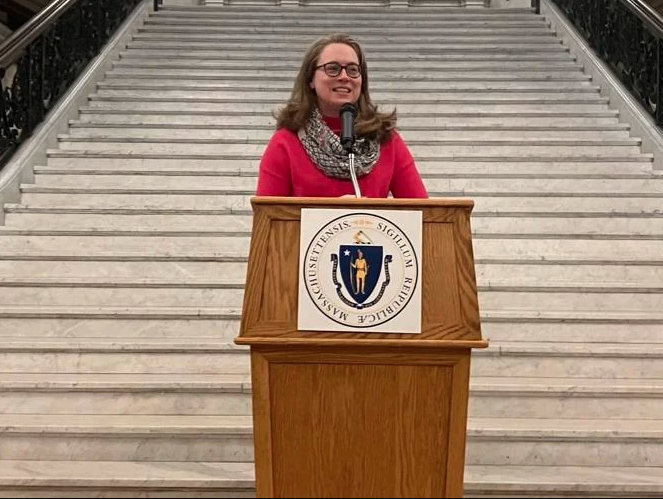New law could ease physician assistant labor gap should Steward Health Care exodus take effect
 Image I Courtesy of Alison Kuznitz, State House News Service
Rep. Christine Barber discussed the importance of physician assistants during a Massachusetts Association of PAs advocacy event on Thursday.
Image I Courtesy of Alison Kuznitz, State House News Service
Rep. Christine Barber discussed the importance of physician assistants during a Massachusetts Association of PAs advocacy event on Thursday.
Dressed in white lab coats, nearly 200 physician assistant students and providers on Thursday pitched their potential to help solve a health care workforce shortage that could worsen given the challenges facing Massachusetts hospitals owned by Steward Health Care.
The leader of the Massachusetts Association of PAs (MAPA) said removing an administrative licensure barrier for physician assistants and allowing them to practice without having a supervising physician could become an urgent need should there be an exodus of providers from Steward Health Care facilities.
Existing law requires PAs to file a "supervising physician" form with the state in order to care for patients. But PAs may be blocked from doing their jobs if their physician leaves a practice and they cannot find a new supervisor within 30 days, said Duncan Daviau, president of MAPA.
"A lot of people may choose to leave Steward with what's going on," Daviau told the News Service, following an advocacy event at the Grand Staircase. "They may be supervising physicians, and then these PAs, if they want to stay on at Steward and take care of their patients, now the onus is on them to find a new supervising physician."
PAs, who are taught at the master's level, must also complete more than 2,000 hours of clinical training, he said. Some PAs serve as people's primary care providers, and they are capable of prescribing medication, evaluating patients, ordering diagnostic tests, and assisting in surgery.
The association's priority legislation would eliminate an existing licensure requirement involving supervising physicians, enabling PAs to "practice at the top of their license" and to treat people in a variety of settings, including in primary care and underserved communities.
The bill (S 1354) filed by Public Health Committee co-chair Sen. Julian Cyr, accompanied by a proposal (H 2135) from Rep. Christine Barber, was reported out favorably by the panel on March 21. The legislation, which would codify the flexibility that PAs temporarily gained during the pandemic, is now in the custody of the Health Care Financing Committee.
A House extension order would give the HCF Committee until July 3 to make a decision about the legislation.
Daviau said the legislation would not change the scope of practice for PAs, who can see patients independently and make their own clinical decisions without needing actual in-person supervision from a physician. In certain settings, such as urgent care centers, PAs do not have their "supervising physician" on site where they practice.
Cyr said the existing licensure requirement, which he called a burden for PAs, dates back to the 1960s, when a town doctor would open a small private practice and hire just one or two physician assistants. But the health care delivery model has changed dramatically, and PAs now collaborate as part of a team with doctors, nurses and other providers at hospitals and community health centers, among other settings, Cyr pointed out.
"The supervising physician who's on file is largely perfunctory. The actual supervision is largely on paper only," Cyr told the News Service. "The requirement to have a physician on paper who's the supervising physician seems a bit outdated and not reflective of how care is delivered today."
The legislation is backed by the Massachusetts Health and Hospital Association, the Massachusetts Association of Behavioral Health Systems, Mass General Brigham and the Cambridge Health Alliance, a spokesperson for MAPA said.
The Massachusetts Association of Health Plans is neutral about the bill and hasn't voiced support or opposition, a spokesperson told the News Service.
The Massachusetts Medical Society opposes the bill, warning it could jeopardize "patient-centered protections and could result in a vastly varying quality of patient care." The group represents more than 25,000 physicians, residents and medical students.
"The Medical Society is concerned that this proposal, aimed at removing supervisory requirements for physician assistants will unnecessarily — and potentially dangerously — distance physicians from patients," MMS said in written testimony to the Public Health Committee in September. "The legislature, in fulfilling its duty to protect patients of the Commonwealth, has diligently established a thoughtful, patient-focused framework of policies and statutory requirements that apply to physicians in light of their ability to independently provide medical care and oversee the care provided by other health care providers."
Beyond issues involving physician assistants, lawmakers are evaluating potential reform options this session to stabilize the fragile health care landscape, grow the workforce and curb disparities in access to care.
Aiming to avoid another crisis like that of Steward, the HCF Committee is examining ways to strengthen regulators' oversight of private equity transactions. House Speaker Ron Mariano recently said the branch is weighing legislation that would take an inventory of health care resources to gauge the impact of launching new projects or cutting services.
Cyr said it's possible but not clear yet whether his bill could be folded into a larger health care reform package.
"There is a strong desire to move forward on a number of priorities in the health space from private equity, to behavioral health, to health equity, to this bill, and I expect we'll see in the coming weeks how that takes shape," Cyr said.
Daviau said he was not aware of exactly how many PAs could be impacted by the Steward financial crisis, in which its Massachusetts hospitals may close or be sold off as the company grapples with massive debt. A spokesperson for the Department of Public Health said officials do not have data tracking where PAs work.
Daviau said he had to search for a new supervising physician when the small private practice he worked at in Leominster closed. Once he got a new job, Daviau said it was a struggle to get the paperwork signed on time to maintain his license.
"This is really a way to kind of move our health care system forward and recognize the immense training that PAs have," Daviau said. "PAs are the only health care professional that needs to have their license appended to another professional. Nurse practitioners don't have that, nurses don't have that, respiratory therapists don't have that."
While PAs were "critical" during the pandemic, Barber said their expertise is even more crucial in today's health care landscape. Barber described the legislation as a solution to the commonwealth's multiple health care crises.
"As legislators, we constantly hear about the workforce crises facing our hospitals, facing our primary care shortage, and facing patients and constituents throughout the commonwealth," Barber told PA students. "And I think that the stories that you have to tell about the work that you're doing and what drove you to do this work to really meet patients where they're at and make sure that they get the highest level of care is actually exactly what we need to be hearing right now."
Students at MAPA's advocacy event, who were slated to meet with lawmakers throughout the day, represented Tufts University, Northeastern University, Massachusetts College of Pharmacy and Health Sciences, and the MGH Institute of Health Professions.
Adding greater flexibility to the profession could enable more PAs to enter the primary care field, said Emily Sevigne, a physician assistant at Mercy Medical Center in Springfield. The ongoing shortage of primary care providers has delayed patients from accessing the preventive care they need.
Sevigne, who works in the emergency department, said she sees a "lot of patients" seeking help for what are considered primary care issues, such as uncontrolled diabetes or hypertension.
"It's so important for us to be able to practice and have more PAs in the primary care setting because there just simply aren't enough providers, especially in these urban areas," she said. "It's difficult because we have to declare a physician that we practice under, whereas nurse practitioners don't in Massachusetts. It's just another unnecessary boundary that was taken away during COVID, and then we saw great things with that in increased access to care."









0 Comments